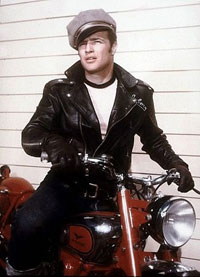Musings
an Online Journal of Sorts
By Alyce Wilson
July 2, 2004 - The Godfather of Acting

Sometime yesterday at UCLA Medical Center, Marlon Brando died of lung failure at the age of 80.
He probably would have preferred if we had never known or remarked on his passing. Notorious recluse, he shunned the public life.
Famously, he failed to show up to receive his second Oscar, for The Godfather in 1972 (his first: for 1954's On the Waterfront), sending instead actress Maria Cruz to accept the award on his behalf and express his concern about the treatment of Native Americans.
Brando decried the public life in his autobiography, Brando: Songs My Mother Taught Me": "I don't think I ever liked being a movie star. No matter what I say or do, people mythologize me."
The whole thing, frankly, made him uncomfortable. In recent years, he'd become an easy punchline due to his growing girth and alleged eccentricities. How dare he hide from Hollywood reporters? How dare he refuse to play the game? How dare he turn up his nose at Hollywood's conspicuous consumption, its obsession with body beautiful?
His family endured private tragedies that became all too public: his son, Christian Brando, was found guilty, jailed and had since been released for killing the boyfriend of his half-sister, Cheyenne. Cheyenne, sadly, committed suicide later.
Through it all, Brando kept a sense of humor. I have to believe that's why he played such an outrageous character in the remake of 1996's The Island of Dr. Moreau. He played a megalomanical inventor, secluded on his own little island, creating hybrids of humans and animals. Other than his deliciously over-the-top performance, the movie is otherwise forgettable except for giving Mike Myers the idea for the character Mini Me in the Austin Powers movies.
A couple years ago, I went through a Marlon Brando phase, renting everything I could find at the local video store. And one of my favorite roles is the young Brando in The Wild One, where he played the leader of a motorcycle gang that swarms into a small town, terrifying the straights.
This movie has that marvelous scene where Brando, dressed in black leather, perched on his motorcycle, leans aggressively forward on the handlebars. One of the townspeople asks him, "What are you rebelling against?"
His reply: "What have you got?"
And of course, you've got to love The Godfather and On the Waterfront, but when I see him in those movies, I see, standing next to him as if in split screen, John Belushi doing his Marlon Brando, one of his great impressions. I'm also reminded of the "Dueling Brandos" sketch on Saturday Night Live, featuring Belushi and, I think, Peter Boyle, facing off with their Brando imitations.
That's the sort of thing that American culture, Hollywood, has done to Marlon Brando, make him larger than life in more ways than one. Somebody who's instantly identifiable through one name, Brando. Someone who, through a number of oft-quoted fragments of dialogue, is instantly recognizable.
For me, that's why Island of Dr. Moreau stands out, as his answer to Hollywood. As if to say, "So this is what you think of me? Well, then I'll be that to the Nth degree."
It's like he's leaning forward on his motorcycle saying, "What have you got?"
Jack Kerouac had some wonderfully insightful things to say about Marlon Brando in 1957:
Elegant complainers say Marlon Brando is ill-dressed, vain, self-centered, Kowalski-Terry Malloy hoodlumish, irresponsible; they picture him as wandering away to leave his girl crying. Yet what is it he has? — that made a girl say, "I just feel that Marlon Brando would know how to love me better than any man in the world, that he would go skipping down the street with me hand-in-hand, that he would do anything and everything, that he would do anything I asked him, and be kind. Because his soul is free and that's why he's so beautiful!" ... Brando is indeed a free soul; his individual approach to his work as well as to his way of life bespeak a strong faith in himself as a man and as an American.
Marlon Brando, the man, has passed on, hopefully to find some secure bliss. Marlon Brando, the legend, continues to loom large in our collective memory, whether as leather-clad rebel or soft-spoken Mafia don.
On his stage, this world, the lights were blinding, blaring. But now at last, his curtain call, to standing ovation.
Moral:
Sometimes being brilliant is more important than being a star.
Copyright
2004 by Alyce Wilson
What
do you think? Share your thoughts
at Alyce's message board (left button):
![]()
![]()

